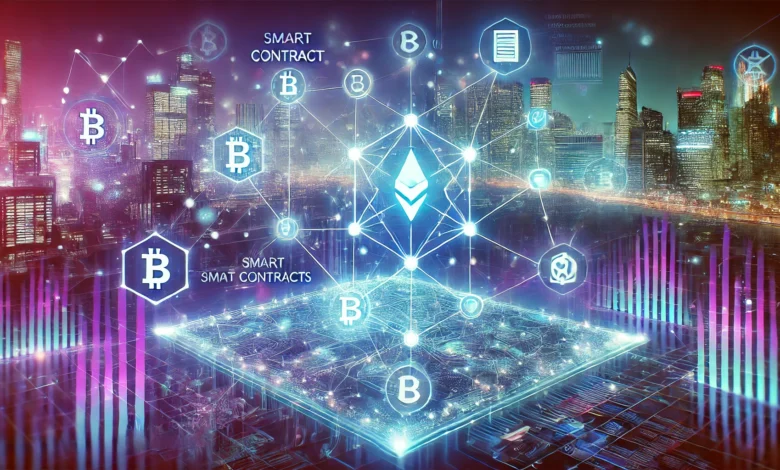The digital revolution has transformed how companies and individuals make transactions, as smart contracts play a major role in this transformation. These agreements are self -implementation eliminates the need for brokers, reduce costs and increase efficiency in various industries. With Blockchain technology as its basis, smart contracts provide security, transparency and automation, making it a game change for digital transactions.
Unlike traditional contracts that require manual implementation and legal intervention, smart contracts operate on decentralized networks, ensuring that transactions are automatically implemented when the pre -defined conditions are met.
This innovation reconfigures industries such as finances, real estate, health care and supply chain management. With adoption growth, understanding the impact of smart contracts and their capabilities is essential for companies and individuals who are looking to move in the digital economy efficiently.
Understanding the basics of smart contracts:
Smart contracts are digital -programmed digital agreements automatically when implementing specific conditions. It is designed with Blockchain technology, ensuring that transactions are resistant to tampering and irreversible. These contracts work without intermediaries, eliminating the risk of manipulation or fraud.
The basic elements of smart contracts include pre -determined rules, self -implementation mechanisms, and encryption security. These components make them a reliable alternative to traditional legal agreements. By using Blockchain, smart contracts guarantee confidence and transparency, which greatly reduces time and costs associated with contract enforcement.
How smart contracts improve security and transparency:
One of the most important advantages of smart contracts is its ability to enhance security and transparency. Traditional contracts often depend on confidence between the parties and the third -party verification, which can provide weaknesses such as fraud and manipulation. Smart contracts eliminate these risks by working on decentralized Blockchain networks.
Blockchain technology records every transaction in a safe and non -changing professor’s book, which makes it impossible to change the terms of the contract as soon as they are published. This transparency guarantees that all parties concerned can verify the implementation of the contract without relying on the mediators, enhancing confidence and accountability in digital transactions.
Industries that benefit from smart contracts:
Banking and banking services:
The financial sector has adopted smart contracts for various requests, including loans, insurance demands and border payments. These mechanical agreements simplify operations, reduce administrative costs and eliminate fraud risks.
- Smart contracts provide immediate transactions without requesting banks or financial institutions.
- It provides automatic risk assessments and ensuring compliance with financial regulations.
Real estate transactions:
Real estate transactions often include multiple limbs, wide papers and long approval processes. Smart contracts simplify these transactions by automating ownership, transferring money, and implementing the contract.
- Buyers and sellers can safely finish transactions without mediators.
- Blockchain smart contracts reduce the risk of fraud by ensuring transparent property records.
Health care and medical records:
Smart contracts convert the health care industry by enhancing data security and simplifying administrative processes. Patient records stored on Blockchain can be safely accessed by approved entities.
- Health care providers can automate insurance claims and patient approval forms.
- Medical research institutions can ensure the sharing of transparent and safe data.
Supply and logistical services chain:
The supply chain industry benefits from smart contracts by improving goods tracking and authenticating goods. These contracts allow for the actual time monitoring, reduce inefficiency and prevent forgery.
- Companies can automate suppliers agreements, ensure payments and time delivery.
- Consumers can access the verified product information and enhance confidence in supply chains.
Protection of legal and intellectual property:
Smart contracts simplify legal agreements by automating the implementation of the contract and enforcement. It also provides a safe way to protect intellectual property rights.
- Creators can guarantee fair compensation through the procedures of kings.
- Legal disputes can be reduced as the terms of the contract are implemented transparently.
Blockchain role in smart contracts:
Blockchain works as a basis for smart contracts, providing a decentralized and implemented platform. Unlike the traditional contracts that depend on the central authorities, the Blockchain guarantees the implementation of the terms of the contract automatically without external interference.
Each transaction registered on Blockchain is irreversible, which prevents fraud or unauthorized adjustments. This feature makes Blockchain smart contracts more secure and reliable than traditional paper agreements. In addition, smart contracts eliminate the need for confidence between the parties, as the Blockchain consensus mechanisms achieve the authenticity of each treatment independently.
Smart contracts challenges and restrictions:
Legal and organizational issues:
Despite its benefits, smart contracts face legal and regulatory obstacles. Many judicial states have not yet recognized that they are legally binding agreements, creating uncertainty for the companies that depend on them.
- The lack of unified regulations holds the adoption of the smart nodes in different regions.
- Legal disputes may arise if the terms of the contract are vague or not coded properly.
Coding weaknesses and security risks:
Smart contracts are only safe like the code that was built. Errors or weaknesses in the code can be used, which leads to financial losses and data violations.
- Developers should be tested strict to ensure security and accuracy in the implementation of the smart contract.
- Smart nodes audit is necessary to reduce the risk of potential weaknesses.
The ability to expand and crowding the network:
As Blockchain networks grow, expansion is a concern for the implementation of the smart nodes. High transactions can lead to network congestion, increase processing times and transactions.
- Layer 2 solutions, such as transactions outside the chain, are explored to enhance expansion.
- The continuous Blockchain promotions aim to improve treatment speed and reduce costs.
How smart contracts allow automatic payments and digital assets:
Smart contracts revolutionize digital financing by automating payments and facilitating the transfer of digital assets. These contracts provide immediate transactions and remove delay related to traditional banking systems.
One of the main applications of smart contracts in the coil -coded area, as it facilitates decentralized financing (Defi). Users can share digital assets, lending or borrowing digital assets without intermediaries, ensuring faster and more cost -effective transactions. In addition, companies can integrate smart contracts into their payment systems to automate salaries, sellers payments and other financial operations.
For those looking to participate in the encryption economy, smart contracts provide new opportunities for Crossing the encryption Through decentralized applications and incentives based on Blockchain. When digital transactions become more simplified, individuals and companies can explore different financial benefits without relying on traditional banking institutions.
The future of smart contracts in digital transactions:
It is expected that the adoption of smart contracts will grow as industries realize their capabilities on efficiency and reduce costs. As Blockchain technology progresses, smart contracts will become more advanced, providing security and enhanced flexibility.
New developments, such as smart contracts that depend on artificial intelligence and multi -power compatibility, are the future of digital transactions. These innovations will enable smart contracts to interact across different Blockchain networks smoothly, and expand their application in various industries.
With the development of organizational frameworks, companies and individuals will gain more confidence in taking advantage of smart contracts for safe and transparent transactions.
conclusion:
Smart contracts appeared as a transformative power in digital transactions, eliminating shortcomings and reducing dependence on mediators. Its impact is clear through industries, from financing and health care to real estate management and the supply chain. By taking advantage of Blockchain technology, smart contracts provide unparalleled safety, transparency and automation, making it a favorite solution to modern digital agreements.
Despite challenges such as legal uncertainty and coding, continuous progress in Blockchain and the development of smart contracts still improve their reliability and ability to expand. As companies and individuals embrace this technology, the future of digital transactions will be defined through efficiency, security and innovation.






